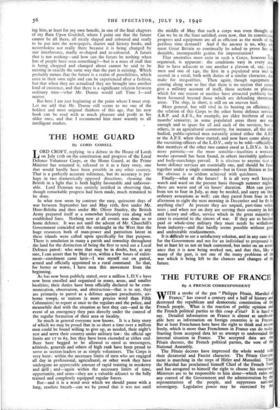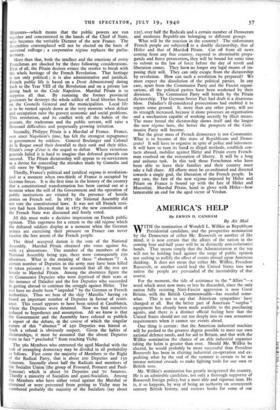THE FUTURE OF FRANCE
By A FRENCH CORRESPONDENT
WITH a stroke of the pen " Philippe Pertain, Marshal of France," has erased a century and a half of history and destroyed the republican and democratic constitution of the French people. What is the reaction of public opinion and the French political parties to this coup d'etat? It is hard to say. Detailed information on France is almost as unobtain- able here as information on foreign countries is in France. But at least Frenchmen here have the right to think and reason freely, which is more than Frenchmen in France can do today Starting from accepted data let us attempt to understand the internal situation in France. The accepted data are the Pertain decrees, the French political parties, the vote of the National Assembly. The Pertain decrees have impressed the whole world with their dictatorial and Fascist character. The Pertain Govern. ment is marching in the steps of Hitler and Mussolini. Thus the Marshal has proclaimed himself Chief of the French State and has arrogated to himself the right to choose his successor Ministers are to be responsible to him alone—which rules our any control of the Government and the administration by the representatives of the people, and suppresses national sovereignty. Legislative power may be exercised by the Ministers—which means that the public powers are run together and concentrated in the hands of the Chief of State, who becomes the veritable Dictator of the new France. The Assemblies contemplated will not be elected on the basis of universal suffrage ; a corporative regime replaces the parlia- mentary.
More than that, both the intellect and the emotions of every Frenchman are shocked by the three following considerations.
First of all, the Petain decrees evince the resolve to break with the whole heritage of the French Revolution. That heritage is not only political ; it is also administrative and juridical. French public life is based on a Droit Administratif dating back to the Year VIII of the Revolution and on a private law dating back to the Code Napoleon. Marshal Petain is to suppress all that. By restoring the former provincial governors he destroys the whole edifice of local liberties based on the Councils General and the municipalities. Local life is to be turned upside down at the very moment when defeat and occupation raise the gravest economic and social problems. This revolution, and its conflict with all the habits of the peasant, the rraclesman and the public servant, will raise a thousand difficulties and perpetually growing irritation.
Secondly, Philippe Petain is a Marshal of France. France, ever since Napoleon's time, has felt the strongest repugnance to government by soldiers. General Boulanger and Colonel de la Roque owed their downfall to their rank and their titles. Petain's coup d'etat is the sequel to defeat. Where victorious generals failed it is hard to imagine that defeated generals can succeed. The Petain dictatorship will appear to ex-servicemen as a device for concealing the mistakes made by Gamelin and still more by Weygand.
Thirdly, France's political and juridical regime is revolution- ised at a moment when two-thirds of France is occupied by German forces. It is the first time in the history of the country that a constitutional transformation has been carried out at a moment when the will of the Government and the operation of public institutions are vitiated by the presence of hostile armies on French soil. In 1871 the National Assembly did not vote the constitutional laws. It was not till French terri- tory had been liberated that in 1875 the new constitution of the French State was discussed and freely voted.
All this must make a decisive impression on French, public opinion. This eagerness for a return to the old, regime, which the defeated, soldiers display at a moment when the German armies are exercising their pressure on France can never receive the free assent of the French people.
The third accepted datum is the vote of the National Assembly. Marshal Petain obtained 56o votes against 8o, with 15 abstentions. The number of the members of the National Assembly being 93o, there were consequently 25o absentees. What is the meaning of these " absences "? A certain number of Deputies in the army may have been killed or taken prisoner; must be assumed that all the rest are hostile to Marshal Petain. Among the absentees figure the 70 ,Communist Deputies who were deprived of their seats at the instance of Daladier and the few Deputies who succeeded in getting abrbad to continue the struggle against Hitler. The rest have no doubt been " impeded " by the German or French authorities. Thus we hear of the ship Massilia ' having en board an important number of Deputies in favour of resist- ance. This vessel appears to have been seized at Casablanca, where the Deputies were detained. Now we find ourselves reduced to hypotheses and assumption. All we know is that the Government and the Assembly have refused to publish a report of the debate, in the course of which the singular nature of this " absence " of 25o Deputies was hinted at. Such a refusal is obviously suspect. Given the habits of dictatorships, it must be assumed that the absent Deputies were in fact " precluded " from reaching Vichy.
The 56o Members who entrusted the aged Marshal with the task of strangling democracy may be divided in all probability as follows. First come the majority of Members to the Right of the Radical Party, that is about zoo Deputies and 1 so Senators. Secondly about half the Radicals and members of the Socialist Union (the group of Frossard, Pomaret and Paul- Boncour) which is about 70 Deputies and 70 Senators. Thirdly a minority of Socialists and quasi-Socialists. Among the Members who have either voted against the Marshal or abstained or were prevented from getting to Vichy may be numbered probably the majority of the Socialists (say about rzo), over half the Radicals and a certain number of Democrats and moderate Republicans belonging to different groups.
What will be the reaction in the country? The unfortunate French people are subjected to a double dictatorship, that pf Hitler and that of Marshal Petain. Cut off from all news coming from any free country, exposed to abominable propa- ganda and fierce persecution, they will be bound for some time to submit to the law of force before the day of revolt and liberation comes. They have no longer any legal means of im- posing their will. They can only escape from the dictatorship by revolution. How can such a revolution be prepared? We must expect the dissolution of the political parties. In any case, apart from the Communist Party and the Fascist organi- sations, all the political parties have been weakened by their divisions. The Communist Party will benefit by the Main dictatorship. The German-Soviet Pact had dealt it a disastrous blow. Daladier's ill-considered prosecutions had enabled it to regain some ground. It, more than any other party, will see its strength increased, because it alone possesses an organisation and a mechanism capable of working secretly by illicit means. The more brutal the dictatorship shows itself and the longer the new regime lasts, the better the prospects of the Com- munist Party will become.
But the great mass of French democracy is not Communist. What is to become of this mass of Republicans and Demo- crats? It will have to organise in spite of police and informers. It will have to turn its hand to illegal methods, establish con- tacts abroad, mobilise against Hitler and Petain every French- man resolved on the restoration of liberty. It will be a long and arduous task. In this task those Frenchmen who have been able to leave their families and their country must take a full share. All efforts must be co-ordinated and directed towards a single goal, the liberation of the French people. In any case, the fate of the new regime imposed by Hitler and Petain on France is bound up with the fate of Hitler and Mussolini. Marshal Petain, hand in glove with Hitler—how lamentable an end for the aged victor of Verdun.



































 Previous page
Previous page